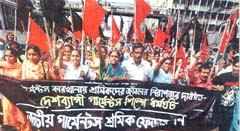Stained Uniforms
Submitted on Thu, 03/30/2006 - 3:52pm
 WILL Major League Baseball be more resistant to change than apartheid South Africa?"
WILL Major League Baseball be more resistant to change than apartheid South Africa?"That's the question posed by Dennis Brutus, a former leading fighter against apartheid who is a founding member of the Pittsburgh Anti-Sweatshop Community Alliance. The group is pressuring the Pittsburgh Pirates baseball team to lead a major league campaign to improve the working conditions of those who stitch and sew uniforms and caps.
The conditions in the sweatshops are deplorable. Pay is virtually subsistence, and on-the-job injury and fatality rates are high. Shifts can run 18 hours with no overtime pay. There is no healthcare insurance, and women are given compulsory pregnancy tests; a positive result is grounds for dismissal. Union organizers usually find themselves out of a job.
Major League Baseball's products are mostly made in free-trade zones in Haiti, El Salvador, Honduras, Bangladesh and Indonesia. Worker abuses are rife. Such fan-giveaway items as hats fall outside the main revenue-sharing agreements the individual teams make with Major League Baseball. They are made in China, where wages are less and abuses greater than in the free-trade zones.
Celeste Taylor, an organizer of the Pittsburgh Anti-Sweatshop Community Alliance, said the goal is "to win over public opinion on how our baseball team will conduct [itself] in our name when it comes to making sure [Major League Baseball] adheres to human/worker rights standards" recognized in the U.S. and in international treaties. "It's unacceptable how low these workers' pay is," Taylor said.
By ratcheting up the pressure on the Pirates, the alliance hopes to force Major League Baseball officials to require apparel suppliers to improve worker conditions. At a conference next month called Sweatfree Communities, alliance members will try to take their campaign to other major league cities across the country.
"We expect the Pirates to be responsive to testimony from workers in factories sewing Pirate apparel, and [we expect] the Pirates to lead, by representing the concerns of Pittsburghers, at the table with the other teams," said Kenneth Miller, an organizer. "We want our team to participate in a public discussion that will [lead to the empowerment of] workers in the factories where [baseball] apparel is made."
The success of the campaign led to a sit-down with Pirate officials last year. Patty Paytas, a Pirate spokeswoman, said then that the team would take the anti-sweatshop alliance's concerns to Major League Baseball officials. But the group has not yet heard from any baseball official.
"The [Pirates] met with us in response to persistent requests. [Team officials] have told us they are interested in the [foreign workers'] testimony we can provide and then when they get it, they stick their heads in the sand," Miller complained. "The pressure on the [team] not to deal with us is coming from the league. We are asking the Pirates to separate themselves from the rest of the league on this issue and to lead [the fight against] the major league sweatshop industry."
The lack of response from official baseball has led the Pittsburgh Anti-Sweatshop Community Alliance to consider civil disobedience at this year's All-Star Game, which is scheduled to be held in Pittsburgh. "We will engage in some form of protest at the All-Star Game," Taylor said. "My hope is that [our protest will be] very planned and powerful [and] will help us win some concrete victories."
"I expect that we will be trained in civil-disobedience procedures by folks like Dennis Brutus," Miller said. "We are the anti-sweatshop pirates of Pittsburgh . We expect the Pirates to participate in the best major league sweatshop education in America and share it with the world at the 2006 All-Star Game. We'll be there to support and evaluate their efforts and testify on behalf of workers."
Ironically, the Pirates are a team celebrated in Latin America, where much of their gear is made, because of Roberto Clemente, the most famous Pirate of all. Clemente, who was born in Puerto Rico, remains a hero in Latin America because of his efforts to improve the lives of the region's inhabitants. He died in a plane crash delivering supplies to quake-ravaged Nicaragua. If Clemente were still alive, it's hard to imagine that he wouldn't be pushing the Pirates to bear some responsibility for how baseball apparel workers in Latin America, and around the world, are treated.